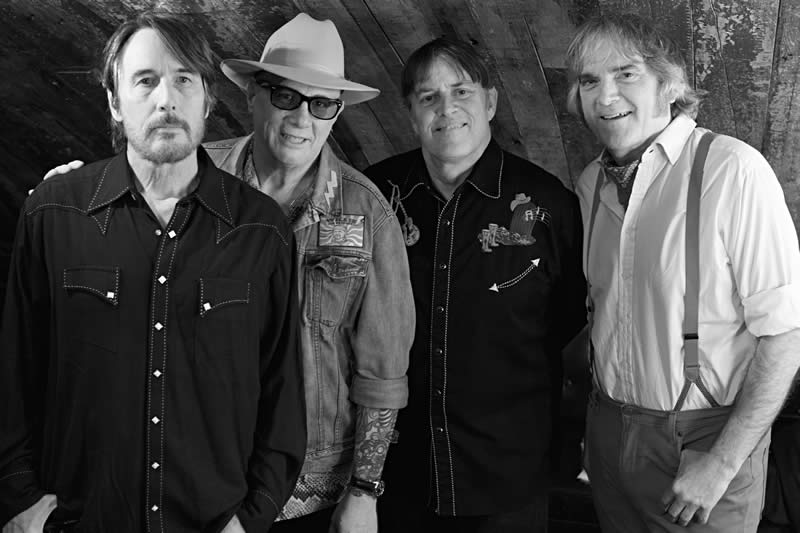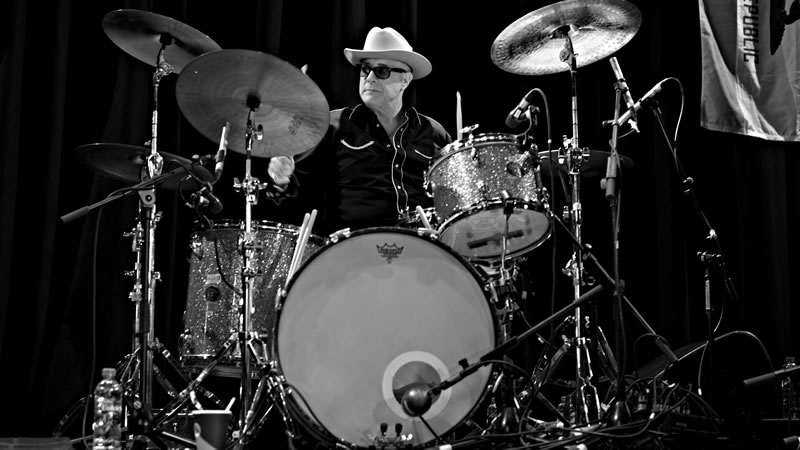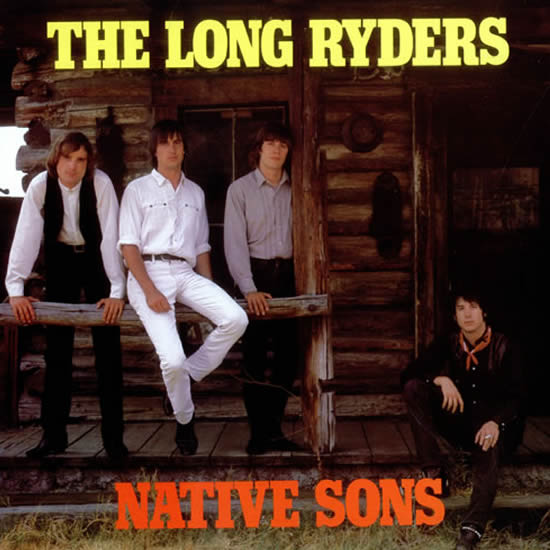Stephen McCarthy: The process for writing songs Is quite different now versus when we all lived in Los Angeles. Once upon a time we could all get together in the same room come up with song ideas and arrangements & work everything out face-to-face. Now we’re doing it long distance via the Internet so that presents a bit more of a challenge. When we met up in LA we had a day to work out the songs and then we went in to record for one week so it went very fast. Ed Stasium is a great producer/engineer & he really has a skilled hand at pulling everything together quickly.
Tom Stevens: A bit unbelievable! Our old associate Larry Chatman now co-owns the fantastic Ocean Way Studios in the San Fernando Valley area of Los Angeles. He offered us the studio for a limited time. We secured Ed Stasium immediately, knowing he was the producer to make it all happen. Everyone sent songs around for approval. Sid wrote words to a couple of my songs, the first time we’d collaborated. The whole process was a whirlwind, and I think it’s the best album we’ve ever made.
Greg Sowders: Better than I could’ve imagined. We’re all a little more mature now and much better players. The whole process was really satisfying.
Since your last album Two-Fisted Tales in 1987, the recording industry has been evolving dramatically. What is your opinion about this evolution?
SG: It is now a digital world. Meaning people can steal albums for free. Between this and streaming, the record industry is dying. The Long Ryders, like most Spotify acts, get one-thirteenth of one cent for a stream. I got 40,023 streams one month of a single song…just this ONE song. And I got about £20-something from Spotify for it. This means there is little reason to make music now as you cannot really make any money from doing so. I am not talking about dreams of riches, that is over, over, over. Right now hard copy sales are so poor and streaming pays so little there is almost no way on Earth a young band…or any band…can make a living playing music. So why would young musicians want to do this for a living? You are doomed to a life of poverty.
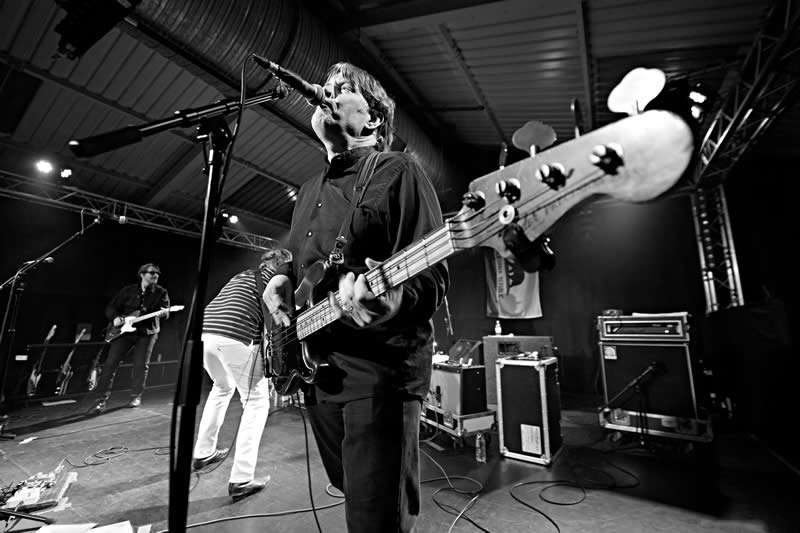
SMc: The recording industry has changed quite dramatically since our last album in the late 1980s. The DIY sensibility is much more prominent now than at that time. So many people have nice studios in their homes and artists don’t need to rely on a major label to get their music out to the fans.
TS: Even then the industry was slowly imploding, particularly for bands that didn’t sell millions. They also transitioned customers from $8 vinyl to $20 CDs, and many customers didn’t come along for the ride. Today it’s completely different. The previous label-artist relationship is mostly gone. Artists are expected to allow large companies like Spotify the use of their music and pay the creators next to nothing. I can’t say that the music business has changed for the better. That said, we have a new album out and are touring successfully. Something is working!
GS: The way people receive and listen to music always changes. From sheet music to radio to Records to CDs to now, there is always new technology. What never changes is quality music and quality song writers. Without the artist and the song, there is nothing.
With the album Psychedelic Country Soul, do you think The Long Ryders have gained the success they deserved in the eighties?
SG: No. Today we do not draw as big audiences that we did in the 1980s, we draw smaller crowds. In the UK and Spain, we are almost where we were in the 1980s but in the rest of the world, we draw noticeably smaller audiences. And of course the new album PCSoul has sold about one-sixth of what Native Sons sold in 1984/1985. People don’t buy hard copies of albums anymore and streaming pays peanuts. Streaming is going to either have to pay more to artists or, without question, the record industry is going to be even smaller than it is now. And it is about half of what it was at its peak twenty years ago! Yes, about half the record industry is gone. Think about that.
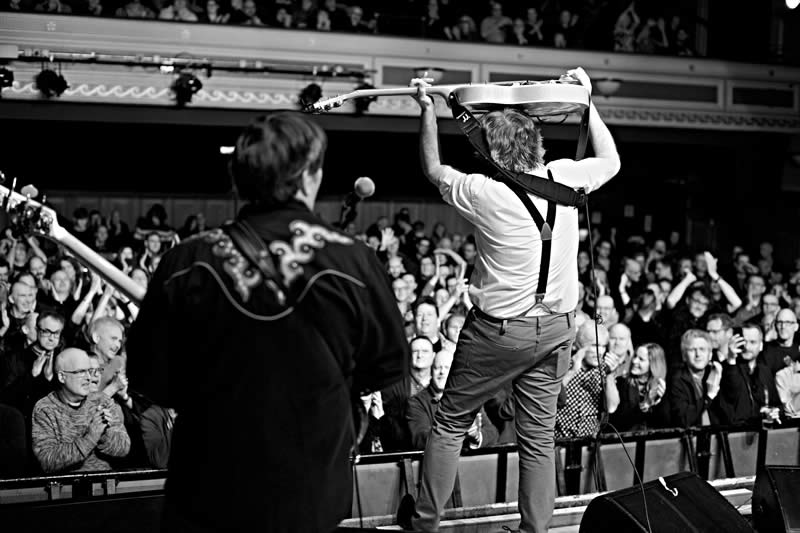
SMc: It is very satisfying to know that we were able to make a well received record in 2017. I had grown tired of singing the same old songs from our repertoire and said to Sid, we need to do something new if I’m going to keep my interest up in this band. It is nice to see us recognized as a link in the chain of Americana music. We took what came before us and added a renewed energy & hopefully encouraged some younger artists to do the same thing.
TS: Yes, I think that we achieved a level of artistic success with this album that eluded us in the 1980s. But I think that the level of financial success for many guitar bands that was possible in the 1980s has passed. Several songs from the new LP could have been massive hits in the right time frame. Now they are finding new ways of reaching fans, but the days of guitar bands selling a million copies of a new single are gone. All that said, we are making the most of how good the new album is, and how good we still are as a live band.
GS: We had a fair amount of success. There are many artists it don’t even get that far. It’s nice to be appreciated for the new record. As the years go by, people start to see you for what you really are. It’s nice to think we left some kind of a marker behind.
The album has garnered excellent reviews, even has got number one in the Official Americana Album Charts. Is it a second chance in The Long Ryders career?
SG: True, Psychedelic Country Soul has received excellent reviews. And we are very grateful for each review, for every single one of them. But, as they say in Hollywood, if reviews sold records then Captain Beefheart would be a big star. So the new album has breathed new life into our career but it has not changed my life or anything like that.
SMc: With this new record out (PCS) it definitely makes us feel more relevant in the current musical landscape. Some of themes that we wrote about many years ago still exist & we are still passionate about them. However, as we are getting older we feel like we have a new perspective on life and the way we approach song writing. We all have families & are not out searching as much but more reflecting on life & such. Still plenty of beauty out there but also many things to be concerned/outraged about! Yes, this new record has given us a feeling that we are not finished yet. TS: Time will tell. It’s been good to us so far!
GS: I don’t really think about second chances. Just think about doing the best we can. We all love each other and enjoy playing music together. The Long Ryders take up a lot of my time right now. I’m happy for that. My work at Warner Chapell is always exciting too.
The song Walls is a tribute from The Long Ryders to Tom Petty. Could you please tell me about your relationship with him and his influence in your music? Why did the band decide to include this song?
SG: Tom Petty came to see the Long Ryders perform live a few times when we all lived in L.A. We knew him a little bit. I lived near Benmont Tench so that was the Heartbreaker I knew the most but Petty was a good guy and would even hang out backstage and talk to you like you were his equal. And in record industry terms we most certainly were not his equal.
Then when we were making Two-Fisted Tales he was also in A&M Studios in Hollywood making Let Me Up. So we were always there past 10 pm and one night at 3 am I was in the A&M studio kitchen reading The L.A. Times newspaper and Tom Petty came in. I didn’t move the newspaper as I was reading a story intently but I heard the door open and a person come in. The only part of me visible were my blue jeans and my hiking boots. With only that to go on, Tom Petty, who I had not seen or spoken to in years, said, “Hi Sid…how is it going over there with the Long Ryders?”. I put down The L.A. Times with my mouth open. How did he know it was me? Hardly a soul was around, most of the Long Ryders had gone home, it was me, Ed Stasium, and engineer Paul Hamingson. Anyway, we had a nice chat about music and then spoke about coffee for awhile.
So as you can see we decided to put Walls on the album because the Heartbreakers were such a great band and Tom Petty was such a great guy. And we decided on Walls as we wanted a good, good song but not one of his more famous ones. We had a fair amount of success. There are many artists it don’t even get that far. It’s nice to be appreciated for the new record. As the years go by, people start to see you for what you really are. It’s nice to think we left some kind of a marker behind.
SMc: Tom Petty died just weeks before we made the new album. Like many people, we were shocked & saddened by his death. We recorded in the next room to him at A&M records way back & he came to see us play a few times. I was also on set for 4 of his videos. 2 of those were with The Traveling Wilburys. We thought the lyrics to Walls was very poignant & decided it would be a nice tribute to him to
include on the album. We were mining the same territory as the heartbreakers, trying to find the intersection of country & rock n roll music.
TS: Tom’s passing caught us all off-guard. He came to see us play, he even told our girlfriends that he was a Long Ryders fan. All of us loved his music. He and The Long Ryders were also in the same studio, A&M in Hollywood, on the old Chaplin lot. He and The Heartbreakers were mixing a new album in late 1986 at the same time The Long Ryders were recording Two-Fisted Tales. They would stop by our studio to listen or chat. Sometimes I’d need a break from a repetitive Long Ryders session and walk out of the studio door. More than once I’d run into Tom roaming the halls for the very same reason. We’d exchange greetings, chainsmoke cigarettes and shoot the shit. He was a great storyteller, and I wish I could remember half of what we discussed while we roamed those studio halls. He was very successful at that time, but he felt like one of us, another hard-working musician on break, hanging out with fellow musicians.
GS: I helped them pick the song because it’s one of his lesser known and best written songs. Tom was always very kind to us and we wanted to let everybody know how much we appreciated him and his music.
Greg cannot come to the European tour. Will it be the first time The Long Ryders play with a different line-up since Tom join the band? Are you going to miss Greg? Greg, How do you feel?
SG: True, Greg cannot come to Europe as he has an important job in Los Angeles. He will be on the next tour for sure. But the Long Ryders played with Des Brewer on bass, with Barry Shank on bass…we have had different line-ups in the past. So while we love Greg and will miss him terribly we must promote the new album. In fact, the drummer replacing Greg is Simon Hancock, a friend of Greg’s from L.A. who Greg choose to be his substitute for this tour.
SMc: This fall we will tour Europe for a few weeks without Greg for the first time in our career. It is not something that we ever wanted to do but he has commitments with his day job as a music publisher & we need to further promote the new album in Europe before the end of the year. Yes we will miss Greg but we have a talented drummer Simon Hancock filling in temporarily.
TS: Yes, it will be the first time ever without Greg. He will be missed not only as a drummer but also as a friend and a balance among the four of us. Our substitute drummer Simon seems excellent and a good guy, so we can only hope for the best for us and for our fans.
GS: I love The Long Ryders and our friend Simon Hancock will sit in for me on Drums. Even the Beatles did a tour without Ringo. The band will be just fine and all the fans will have a great time. We used a couple of different bass players in the 80s when people couldn’t make it. You get great shows and I’ll see you all soon. I’m not going anywhere and neither are the Long Ryders! Thx and bye for now.
The Long Ryders are:
- Sid Griffin guitar, harmonica, autoharp, therapy & vocals.
- Greg Sowders drums, percussion & song publishing.
- Tom Stevens bass, acoustic bass, computer genius & vocals.
- Stephen McCarthy main guitar, banjo, mandolin, lap steel & vocals.

